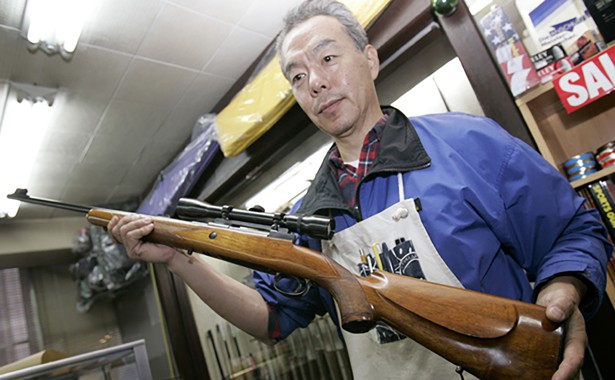In part by forbidding almost all forms of firearm ownership, the country has as few as two gun-related homicides a year.

I’ve heard it said that, if you take a walk around Waikiki, it’s only a matter of time until someone hands you a flyer of scantily clad women clutching handguns, overlaid with English and maybe Japanese text advertising one of the many local shooting ranges. The city’s largest, the Royal Hawaiian Shooting Club, advertises instructors fluent in Japanese, which is also the default language of its website. For years, this peculiar Hawaiian industry has explicitly targeted Japanese tourists, drawing them away from beaches and resorts into shopping malls, to do things that are forbidden in their own country.
Waikiki’s Japanese-filled ranges are the sort of quirk you might find in any major tourist town, but they're also an intersection of two societies with wildly different approaches to guns and their role in society. Friday’s horrific shooting at an Aurora, Colorado, movie theater has been a reminder that America's gun control laws are the loosest in the developed world and its rate of gun-related homicide is the highest. Of the world’s 23 “rich” countries, the U.S. gun-related murder rate is almost 20 times that of the other 22. With almost one privately owned firearm per person, America’s ownership rate is the highest in the world; tribal-conflict-torn Yemen is ranked second, with a rate about half of America's.Almost no one in Japan owns a gun. Most kinds are illegal, with onerous restrictions on buying and maintaining the few that are allowed. Even the country's infamous, mafia-like Yakuza tend to forgo guns; the few exceptionstend to become big national news stories.
Japanese tourists who fire off a few rounds at the Royal Hawaiian Shooting Club would be breaking three separate laws back in Japan—one for holding a handgun, one for possessing unlicensed bullets, and another violation for firing them -- the first of which alone is punishable by one to ten years in jail. Handguns are forbidden absolutely. Small-caliber rifles have been illegal to buy, sell, or transfer since 1971. Anyone who owned a rifle before then is allowed to keep it, but their heirs are required to turn it over to the police once the owner dies.
The only guns that Japanese citizens can legally buy and use are shotguns and air rifles, and it’s not easy to do. The process is detailed in David Kopel’s landmark study on Japanese gun control, published in the 1993 Asia Pacific Law Review, still cited as current. (Kopel, no left-wing loony, is a member of the National Rifle Association and once wrote in National Review that looser gun control laws could have stopped Adolf Hitler.)
Even the most basic framework of Japan’s approach to gun ownership is almost the polar opposite of America’s. U.S. gun law begins with the second amendment's affirmation of the “right of the people to keep and bear arms” and narrows it down from there. Japanese law, however, starts with the 1958 actstating that “No person shall possess a firearm or firearms or a sword or swords,” later adding a few exceptions. In other words, American law is designed to enshrine access to guns, while Japan starts with the premise of forbidding it. The history of that is complicated, but it's worth noting that U.S. gun law has its roots in resistance to British gun restrictions, whereas some academic literature links the Japanese law to the national campaign to forcibly disarm the samurai, which may partially explain why the 1958 mentions firearms and swords side-by-side.
The Japanese and American ways of thinking about crime, privacy, and police powers are so different—and Japan is such a generally peaceful country—that it’s functionally impossible to fully isolate and compare the two gun control regiments. It's not much easier to balance the costs and benefits of Japan's unusual approach, which helps keep its murder rate at the second-lowest in the world, though at the cost of restrictions that Kopel calls a “police state,” a worrying suggestion that it hands the government too much power over its citizens. After all, the U.S. constitution’s second amendment is intended in part to maintain “the security of a free State” by ensuring that the government doesn't have a monopoly on force. Though it's worth considering another police state here: Tunisia, which had the lowest firearm-ownership rate in the world (one gun per thousand citizens, compared to America’s 890) when its people toppled a brutal, 24-year dictatorship and sparked the Arab Spring.
No comments:
Post a Comment